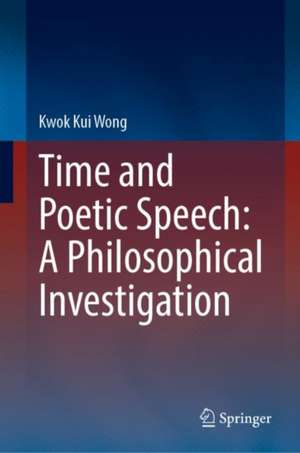Time and Poetic Speech: A Philosophical Investigation
Autor Kwok Kui Wongen Limba Engleză Hardback – 26 oct 2022
| Toate formatele și edițiile | Preț | Express |
|---|---|---|
| Paperback (1) | 692.09 lei 43-57 zile | |
| Springer International Publishing – 27 oct 2023 | 692.09 lei 43-57 zile | |
| Hardback (1) | 698.15 lei 43-57 zile | |
| Springer International Publishing – 26 oct 2022 | 698.15 lei 43-57 zile |
Preț: 698.15 lei
Preț vechi: 821.35 lei
-15% Nou
Puncte Express: 1047
Preț estimativ în valută:
133.60€ • 138.70$ • 111.41£
133.60€ • 138.70$ • 111.41£
Carte tipărită la comandă
Livrare economică 24 martie-07 aprilie
Preluare comenzi: 021 569.72.76
Specificații
ISBN-13: 9783031124549
ISBN-10: 3031124545
Pagini: 188
Ilustrații: VIII, 188 p. 4 illus., 1 illus. in color.
Dimensiuni: 155 x 235 mm
Greutate: 0.45 kg
Ediția:1st ed. 2022
Editura: Springer International Publishing
Colecția Springer
Locul publicării:Cham, Switzerland
ISBN-10: 3031124545
Pagini: 188
Ilustrații: VIII, 188 p. 4 illus., 1 illus. in color.
Dimensiuni: 155 x 235 mm
Greutate: 0.45 kg
Ediția:1st ed. 2022
Editura: Springer International Publishing
Colecția Springer
Locul publicării:Cham, Switzerland
Cuprins
Chapter 1: The Flux of Time.- Chapter 2: Movement of the Soul, Affect and Language.- Chapter 3: Rhythm.- Chapter 4: Metaphor.- Chapter 5: Syntax.
Notă biografică
Dr. Wong Kwok Kui is Associate Professor at the Department of Humanities and Creative Writing, Baptist University of Hong Kong. He received his Ph.D. in Philosophy from the University of Tübingen, Germany, under the supervision of Prof. Günter Figal. His research interests include Nietzsche, Schelling, hermeneutics, the problem of time and poetics, and theatre aesthetics. His latest publications include: Nietzsche: from Dionysus to Übermensch (in Chinese), and articles such as “Rhythm and the Symbolic Process in Nietzsche’s The Birth of Tragedy” (New Nietzsche Studies), “Schelling’s Understanding of Laozi”, (Dao: Journal of Comparative Philosophy), “Hegel’s Criticism of Laozi and Its Implications” (Philosophy East and West), and “Schelling’s Criticism of Kant’s Theory of Time” (Idealistic Studies). Wong is also an award-winning playwright and has staged more than fifteen plays in such cities and countries as Hong Kong, Macau, Taiwan, Edinburgh, South Korea and Poland.
Textul de pe ultima copertă
This book analyzes the relation between the flow time and poetic speech in drama and rhetoric. It begins with the classical understanding of time as flux, and its problems and paradoxes entailing from Aristotle, Augustine, Kant and Husserl. The reader will see how these problems unfold and find resolutions through dramatic speech and rhetoric which has an essential relation to the flow of time. It covers elements in poetic speech such as affect, rhythm, metaphor, and syntax. It uses examples from classical rhetorical theories by Aristotle, Cicero, Quintilian, dramatic speeches from Shakespeare, as well as other modern dramatic texts by Chekhov, Beckett, Jelinek and Sarah Kane. This book appeals to students and academic researchers working in the philosophical fields of aesthetics and phenomenology as well those working in theater and the performing arts.
Caracteristici
Opens new ground for studying the problem of time by using the practical temporal experience of speaking Inspired by Ricoueur's work on time and narrative yet focusing on the medium of narrative as such, namely language itself Written by a scholar and philosopher who is also an art practitioner and playwright
